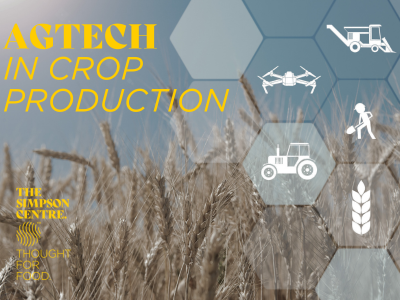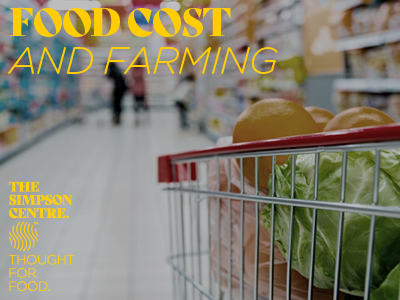Webinars
Recent Webinars
The digital revolution is reshaping agriculture, but what actually drives the adoption of new technologies in Canada’s farming sector? Beyond the new tools, how do behavioral, socio-economic and policy factors influence farmers’ decisions? Join The Simpson Centre for Food and Agricultural Policy on March 13, 2025, for a webinar that addresses the intersection of digital agriculture, technology adoption, and data governance.
Producers, technology providers, policy experts, and researchers will all benefit from this webinar exploring of the challenges and opportunities of digital agriculture. From barriers to adoption to the role of investment, this discussion goes to the heart of critical issues shaping the future of farming in Canada.
With digital agriculture evolving rapidly, this webinar offers an opportunity to better understand how Canada’s farming sector can harness technological advancements to address real world challenges while safeguarding the interests of producers.
Wednesday, March 26, 2025
What myths and realities shape public perceptions of the Canadian Agriculture and Agri-food sectors? How do they ripple through the industry and beyond? Join us for the third installment of the Simpson Centre’s ‘Behind the Label’ Public Education webinar series. This webinar will explore the impact of misinformation on agriculture, demystify misconceptions and elaborate on its effects on practices, policies, and consumer behaviour. The webinar will also examine misconceptions concerning water resource allocation, sustainable usage, misinformation-driven challenges in Canadian agriculture, and prospective solutions to drive progress and resilience.
Hear from Grace Skogstad, professor emeritus at the University of Toronto and an esteemed scholar specializing in Canadian agricultural and food policy, whose research explores the political economy of agriculture, biofuels, and genetically modified products in Canada, North America, and Europe. Joining her are Nevin Rosaasen and Margo Jarvis Redelback. Nevin Rosaasen is a fourth-generation farmer from Saskatchewan and the Sustainability and Government Relations Lead at Alberta Pulse Growers. With a strong academic foundation in agriculture and international trade policy and hands-on farming experience, Nevin focuses on water, biodiversity, pesticides, and climate change while advocating for farmers at the grassroots level. Margo Jarvis Redelback is a professional agrologist and executive director of the Alberta Irrigation Districts Association, where she has driven significant infrastructure modernization and investment in Alberta’s irrigation sector. As a leader in agriculture, advocate for women, and dedicated 4-H volunteer, she exemplifies professionalism, community engagement, and a strong connection to her family farm and rural lifestyle. Together, they offer unique insights into the intersection of policy, sustainability, and the realities of modern farming.
Through this event, the Simpson Centre continues its mission of supporting Canada’s agriculture and agri-food sectors by promoting informed, evidence-based dialogue among stakeholders. Don’t miss this opportunity to gain valuable insights into the challenges and opportunities shaping Canadian agriculture.
Wednesday, January 29, 2025
What do sustainable food labels tell us about the practices behind our food production? Are these labels fostering environmentally conscious decisions or simply adding costs to consumers and producers? Join our panel discussion as we explore sustainable beef and crop production, examining the certification processes, public perceptions, and the challenges of labelling standards. Our experts will also provide insights through an ESG lens, discussing how sustainability frameworks shape industry practices and influence consumer behaviour. We’ll explore how these frameworks guide corporate strategies, shape policies, and drive long-term market competitiveness. This webinar aims to demystify food labelling and empower consumers to make informed choices in today’s evolving food system.
This is your chance to explore the science behind sustainable beef and crop production and understand how certification processes, resource management, and sustainability frameworks shape the food on your plate.
Wednesday, November 20, 2024
What do organic food labels say about the production of our food? Are these products really better? And if so, in what way? Or are we creating niche markets that encourage the consumption of higher-priced products we don’t need? Join our panel discussion to delve into the production practices behind organic food labels and the nutrient density of our crops.
Hear from a registered dietitian known for her work with Canadian Food Focus as she shares stories that connect farming and food. We’ll also feature insights from a professor emeritus at the Cumming School of Medicine, University of Calgary, about the nutrient density of fruits and vegetables for better health. This is your chance to explore farm management practices behind organic food labels and learn how to ask the right questions to connect soil health and farming practices with the products you consume.
Thursday, September 12, 2024
Canada’s agricultural industry is embracing digital advancements, driven by innovation and technology. In this webinar, we’ll explore the latest agtech innovations in Canada’s crop sector. From artificial intelligence and machine learning to robotics and sensor technology, our expert speakers will showcase groundbreaking research and emerging trends shaping the future of agriculture.
In this unique 75-minute webinar, we will connect researchers and producers by incorporating commentary and questions from the field. Gain valuable insights as Canadian producers share their experiences with AI, robotics, drones, and sensor technology. This interactive session promises to provide valuable insights into the benefits and challenges of adopting agtech in Canada, offering perspectives both from reports and from the field. Don’t miss this opportunity to be part of the conversation shaping the future of agriculture in Canada.
Wednesday, July 17, 2024
Ever wonder what factors affect the availability and pricing of our food? From the impact of weather and climate patterns to the influence of government policies and subsidies, there are multiple factors at play that impact the financial sustainability of farms in Canada – and your grocery bills. Join us for an exploration into farm production costs affecting raw food products, such as apples and grapes, as well as the wheat that you find in your pasta or bread. Discover what truly goes into running a farm operation in Canada and the factors influencing its financial sustainability.
Whether you’re a farmer, industry professional, or simply curious about the forces shaping our food system, this webinar promises valuable insights. Don’t miss the opportunity to gain a deeper understanding of agricultural management and the challenges faced by today’s farmers.
Thursday, May 16, 2024
- 1
- 2
- 3
- …
- 10
- Go to Next Page





